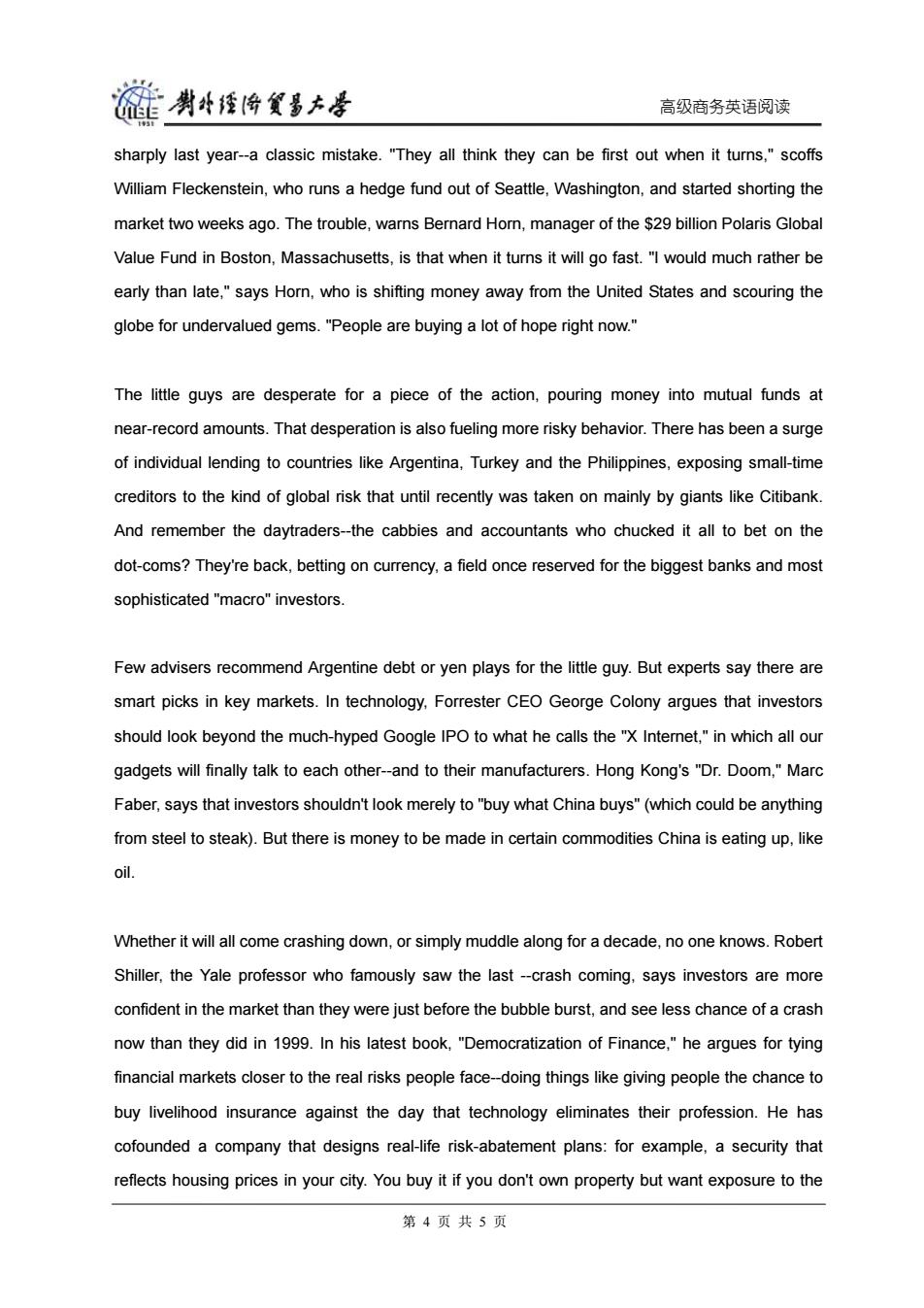正在加载图片...

链勇经份贸多大圣 高级商务英语阅读 sharply last year--a classic mistake."They all think they can be first out when it turns,"scoffs William Fleckenstein,who runs a hedge fund out of Seattle,Washington,and started shorting the market two weeks ago.The trouble,warns Bernard Horn,manager of the $29 billion Polaris Global Value Fund in Boston,Massachusetts,is that when it turns it will go fast."I would much rather be early than late,"says Horn,who is shifting money away from the United States and scouring the globe for undervalued gems."People are buying a lot of hope right now." The little guys are desperate for a piece of the action,pouring money into mutual funds at near-record amounts.That desperation is also fueling more risky behavior.There has been a surge of individual lending to countries like Argentina,Turkey and the Philippines,exposing small-time creditors to the kind of global risk that until recently was taken on mainly by giants like Citibank. And remember the daytraders--the cabbies and accountants who chucked it all to bet on the dot-coms?They're back,betting on currency,a field once reserved for the biggest banks and most sophisticated "macro"investors. Few advisers recommend Argentine debt or yen plays for the little guy.But experts say there are smart picks in key markets.In technology,Forrester CEO George Colony argues that investors should look beyond the much-hyped Google IPO to what he calls the"X Internet,"in which all our gadgets will finally talk to each other--and to their manufacturers.Hong Kong's"Dr.Doom,"Marc Faber,says that investors shouldn't look merely to "buy what China buys"(which could be anything from steel to steak).But there is money to be made in certain commodities China is eating up,like oil. Whether it will all come crashing down,or simply muddle along for a decade,no one knows.Robert Shiller,the Yale professor who famously saw the last--crash coming,says investors are more confident in the market than they were just before the bubble burst,and see less chance of a crash now than they did in 1999.In his latest book,"Democratization of Finance,"he argues for tying financial markets closer to the real risks people face--doing things like giving people the chance to buy livelihood insurance against the day that technology eliminates their profession.He has cofounded a company that designs real-life risk-abatement plans:for example,a security that reflects housing prices in your city.You buy it if you don't own property but want exposure to the 第4页共5页高级商务英语阅读 sharply last year--a classic mistake. "They all think they can be first out when it turns," scoffs William Fleckenstein, who runs a hedge fund out of Seattle, Washington, and started shorting the market two weeks ago. The trouble, warns Bernard Horn, manager of the $29 billion Polaris Global Value Fund in Boston, Massachusetts, is that when it turns it will go fast. "I would much rather be early than late," says Horn, who is shifting money away from the United States and scouring the globe for undervalued gems. "People are buying a lot of hope right now." The little guys are desperate for a piece of the action, pouring money into mutual funds at near-record amounts. That desperation is also fueling more risky behavior. There has been a surge of individual lending to countries like Argentina, Turkey and the Philippines, exposing small-time creditors to the kind of global risk that until recently was taken on mainly by giants like Citibank. And remember the daytraders--the cabbies and accountants who chucked it all to bet on the dot-coms? They're back, betting on currency, a field once reserved for the biggest banks and most sophisticated "macro" investors. Few advisers recommend Argentine debt or yen plays for the little guy. But experts say there are smart picks in key markets. In technology, Forrester CEO George Colony argues that investors should look beyond the much-hyped Google IPO to what he calls the "X Internet," in which all our gadgets will finally talk to each other--and to their manufacturers. Hong Kong's "Dr. Doom," Marc Faber, says that investors shouldn't look merely to "buy what China buys" (which could be anything from steel to steak). But there is money to be made in certain commodities China is eating up, like oil. Whether it will all come crashing down, or simply muddle along for a decade, no one knows. Robert Shiller, the Yale professor who famously saw the last --crash coming, says investors are more confident in the market than they were just before the bubble burst, and see less chance of a crash now than they did in 1999. In his latest book, "Democratization of Finance," he argues for tying financial markets closer to the real risks people face--doing things like giving people the chance to buy livelihood insurance against the day that technology eliminates their profession. He has cofounded a company that designs real-life risk-abatement plans: for example, a security that reflects housing prices in your city. You buy it if you don't own property but want exposure to the 第 4 页 共 5 页